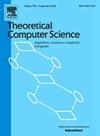Payment scheduling in the Interval Debt Model
IF 0.9
4区 计算机科学
Q3 COMPUTER SCIENCE, THEORY & METHODS
引用次数: 0
Abstract
The network-based study of financial systems has received considerable attention in recent years but has seldom explicitly incorporated the dynamic aspects of such systems. We consider this problem setting from the temporal point of view and introduce the Interval Debt Model (IDM) and some scheduling problems based on it, namely: Bankruptcy Minimization/Maximization, in which the aim is to produce a payment schedule with at most/at least a given number of bankruptcies; Perfect Scheduling, the special case of the minimization variant where the aim is to produce a schedule with no bankruptcies (that is, a perfect schedule); and Bailout Minimization, in which a financial authority must allocate a smallest possible bailout package to enable a perfect schedule. We show that each of these problems is NP-complete, in many cases even on very restricted input instances. On the positive side, we provide for Perfect Scheduling a polynomial-time algorithm on (rooted) out-trees although in contrast we prove NP-completeness on directed acyclic graphs, as well as on instances with a constant number of nodes (and hence also constant treewidth). When we allow non-integer payments, we show by a linear programming argument that the problem Bailout Minimization can be solved in polynomial time.
求助全文
约1分钟内获得全文
求助全文
来源期刊

Theoretical Computer Science
工程技术-计算机:理论方法
CiteScore
2.60
自引率
18.20%
发文量
471
审稿时长
12.6 months
期刊介绍:
Theoretical Computer Science is mathematical and abstract in spirit, but it derives its motivation from practical and everyday computation. Its aim is to understand the nature of computation and, as a consequence of this understanding, provide more efficient methodologies. All papers introducing or studying mathematical, logic and formal concepts and methods are welcome, provided that their motivation is clearly drawn from the field of computing.
 求助内容:
求助内容: 应助结果提醒方式:
应助结果提醒方式:


